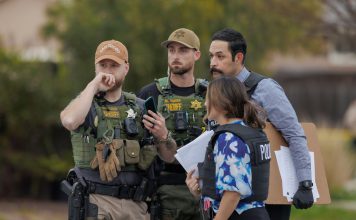District finds adhering to NCLB very difficult
Gilroy – When the calendar flips to June the federal government expects to see one specific kind of educator in every classroom across the nation: a highly qualified one.
And as the deadline looms, the confusion and resentment that emerged following the birth of the “highly qualified” phrase continues to grow.
“It’s very frustrating, to say the least,” said Linda Piceno, assistant superintendent of human resources.
The frustration stems from the No Child Left Behind highly qualified requirement, a recipe dreamt up by the feds that many educators say penalizes experienced teachers, while rewarding those with little or no experience.
And it’s such a complicated mandate that Piceno is still not sure how many of the Gilroy Unified School District teachers are not NCLB compliant. The base of the law states that to be considered highly qualified teachers must be subject matter competent.
So what exactly does that mean?
Any intern teacher – individuals who have not yet earned a credential – are considered compliant if they have passed the California Subject Examinations Test, the state’s teacher entrance exam, in the area taught.
Elementary school teachers take the test in multiple subjects while high school teachers are tested in a single subject. For example, a high school teacher who took the CSET in math and is teaching English is not considered highly qualified while an elementary educator who passed the multiple subject test is qualified.
“So if I’ve passed the CSET I’ve demonstrated subject matter competence,” Piceno said.
Teachers may also earn the label after accumulating 32 college units in the subject taught or if they have spent at least five years teaching that discipline.
Here’s the sticky part: an intern teacher who has yet to spend a day in the classroom but has passed the CSET is considered qualified under the law, while a woman who spent the past 20 years teaching middle school English, but has a single subject credential in history is not.
To Cherie Foster, who has worked in both private and public school settings, that rule makes little sense. At Oakwood Country School in Morgan Hill, Foster found “incredible” educators who had college degrees but no credentials.
And at the same time, she’s worked with teachers who are deemed “highly qualified” but who Foster considers incompetent.
“I think it’s important to be successfully qualified, however I don’t think a piece of paper necessarily declares a person to be a highly qualified teacher,” said Foster, now a teacher at Eliot Elementary School.
Still, the longtime educator does understand the intent of the law: to ensure that children no matter where they’re attending school are taught by a staff of quality teachers. And as a teacher at a school with a majority population of poor children, she definitely agrees that low-income students shouldn’t receive an inferior education.
Some educators agree NCLB has brought about some positive changes. In the past, low-income schools were often filled with emergency credentialed teachers and since the temporary certificates were renewable every five years, staffers often took their sweet time earning a true credential.
Now, intern teachers have two years to earn a credential. But there are some serious drawbacks to the NCLB requirement, such as the nationwide teacher shortage, Piceno said.
“In a perfect world I would say yes, that’s wonderful, but you have to look at the supply and demand in the state of California,” she said.
And the supply in some areas is even more skimpy. Currently, the district is still trying to fill multiple math and special education vacancies. Also a middle school Spanish teacher recently quit.
In addition, while, the district has steadily increased the number of qualified teachers, meeting the June 2007 deadline will be a challenge.
On Thursday, Piceno took 40 teachers to a state department of education workshop specifically tailored to address the quality teacher issue. While Piceno highly doubts that she’ll discover that all the teachers are in fact considered unqualified under NCLB, she’s not taking any chances.
“I’m taking this really seriously,” she said. “If we get audited I want to make sure we’re following the rules.”
When they return to Gilroy she’ll know exactly where the district stands..
“We think we will come back (with), worse case 30,” she said. “Best case, 15 or 20.”












